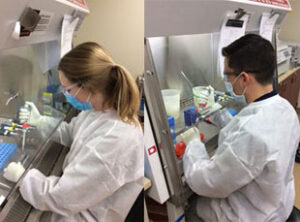 For many graduate students, the emergence of SARS-COV-2 (the virus that causes COVID-19) greatly disrupted their research. For Katarina Braun and Gage Moreno, the pandemic shifted their entire focus from research on viruses like influenza and AIDS to the coronavirus. University of Wisconsin – Madison graduate students Braun, an MD and PhD student in the Medical Scientist Training Program and in Cellular and Molecular Biology, and Moreno, a PhD student in Cellular and Molecular Pathology, began studying the virus together in February.
For many graduate students, the emergence of SARS-COV-2 (the virus that causes COVID-19) greatly disrupted their research. For Katarina Braun and Gage Moreno, the pandemic shifted their entire focus from research on viruses like influenza and AIDS to the coronavirus. University of Wisconsin – Madison graduate students Braun, an MD and PhD student in the Medical Scientist Training Program and in Cellular and Molecular Biology, and Moreno, a PhD student in Cellular and Molecular Pathology, began studying the virus together in February.
As viruses spread, they replicate, and often the copies produced are not identical. Very small errors occur, and these changes, called mutations, can affect the spread of a virus. Using genetic sequencing, Braun and Moreno have identified variations in the virus among individuals infected in the state of Wisconsin. Being able to pinpoint the various mutations allows the researchers to track how the virus spreads and establish points of transmission. Their research has also been helpful in establishing risk probability for healthcare workers. By studying the particular genetic sequence of the virus in a Wisconsin healthcare professional and compare it to those of the patients being treated, Braun and Moreno could establish that the virus transmission likely occurred from exposure in the community, not the healthcare facility.
Their research is still in early phases, but they have made it publicly available to help researchers across the globe learn more about the virus. Braun and Moreno credit their advisors, Thomas Friedrich and David O’Connor, for ensuring open access to their data in an effort to benefit the global scientific community. “I feel lucky to be in a lab where I have had the opportunity to participate in the scientific community’s response to this virus,” Braun said. To learn more about Katarina and Gage’s work, visit the University of Wisconsin—Madison website.
